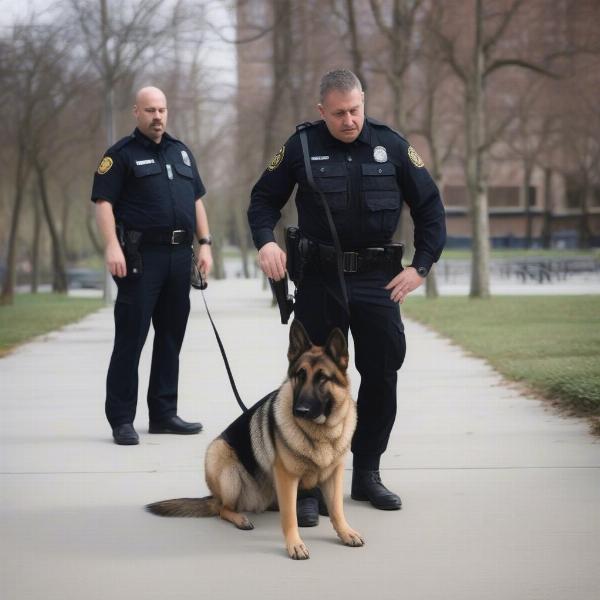Police dog handlers play a crucial role in law enforcement, working alongside highly trained canine partners. This demanding yet rewarding career requires dedication, specific skills, and a deep understanding of canine behavior. This guide explores the path to becoming a police dog handler, covering the necessary qualifications, training, and day-to-day realities of this unique profession.
What Does a Police Dog Handler Do?
Police dog handlers, also known as K9 officers, are responsible for the training, care, and deployment of police dogs. These dogs are trained for a variety of tasks, including suspect apprehension, narcotics detection, explosives detection, search and rescue, and tracking. The handler is responsible for ensuring the dog’s well-being, maintaining its training, and deploying it effectively in various operational scenarios. They form an inseparable team, relying on each other for safety and success.
 Police Dog Handler on Duty
Police Dog Handler on Duty
Qualifications and Requirements
The specific requirements for becoming a police dog handler vary depending on the law enforcement agency and country. However, some common prerequisites include:
- Law Enforcement Experience: Most agencies require candidates to have served as a police officer for a certain period, typically 2-3 years, demonstrating competence in basic policing duties. This experience provides a foundation in law enforcement procedures, legal frameworks, and operational protocols.
- Physical Fitness: Handlers need to be physically fit to keep up with their canine partners, often in challenging environments. This includes running, jumping, and navigating obstacles, requiring strength, stamina, and agility.
- Clean Criminal Record: A clean criminal record and background check are essential. This ensures the integrity and trustworthiness of the handler, as they will be entrusted with significant responsibilities.
- Valid Driver’s License: Handlers need a valid driver’s license to operate police vehicles, transporting themselves and their canine partners to various locations.
The Training Process
The journey to becoming a police dog handler typically involves a rigorous training program, both for the officer and the dog. This program often includes:
- Dog Handling Skills: Learning to understand canine behavior, communication, and training techniques is fundamental. This includes obedience training, scent work, and apprehension techniques, building a strong bond and effective partnership.
- Specialized Training: Depending on the dog’s specialization, handlers undergo specific training in areas like narcotics detection, explosives detection, or search and rescue. This specialized training equips them to handle the specific tasks their canine partner is trained for.
- Ongoing Training and Certification: Continuing education and regular certifications are crucial to maintain proficiency. This ensures that both the handler and the dog remain up-to-date with the latest techniques and standards in police dog handling.
Day-to-Day Responsibilities
The daily responsibilities of a police dog handler extend beyond training and deployment. They include:
- Dog Care: Handlers are responsible for the daily care of their canine partners, ensuring they are fed, groomed, and receive regular veterinary check-ups. This constant care is essential for maintaining the dog’s health and well-being.
- Record Keeping: Maintaining detailed records of the dog’s training, health, and deployments is vital. This documentation ensures accountability and provides valuable information for future training and operational planning.
- Community Engagement: Handlers often participate in community outreach programs, educating the public about the role of police dogs. This engagement helps build positive relationships between law enforcement and the community.
What Qualities Make a Good Police Dog Handler?
Beyond the formal requirements, certain personal qualities contribute to success as a police dog handler:
- Patience and Empathy: Handlers need to be patient and empathetic, understanding the dog’s needs and motivations. This understanding is crucial for building a strong bond and fostering effective communication.
- Decisiveness and Courage: In high-pressure situations, handlers must make quick decisions and demonstrate courage. This ability to remain calm and decisive is essential for ensuring the safety of themselves, their canine partners, and the public.
- Strong Communication Skills: Effective communication is essential for working with the dog, other officers, and the public. This includes clear verbal commands, non-verbal cues, and the ability to convey information accurately and concisely.
Conclusion
Becoming a police dog handler is a challenging but rewarding career path, demanding dedication, skill, and a deep love for dogs. By understanding the qualifications, training process, and day-to-day realities, aspiring handlers can embark on this fulfilling journey. This profession offers a unique opportunity to combine law enforcement with the rewarding partnership of a highly trained canine companion.
FAQ
- How long does it take to become a police dog handler? It typically takes several years, including time served as a police officer and the specialized dog handling training program.
- What breeds are commonly used as police dogs? German Shepherds, Belgian Malinois, and Dutch Shepherds are among the most common breeds.
- Is being a police dog handler dangerous? The job can be inherently dangerous, as handlers are often involved in high-risk situations.
- What happens to police dogs when they retire? Many police dogs retire and live with their handlers, becoming beloved family pets.
- Can anyone become a police dog handler? No, it requires meeting specific qualifications, including law enforcement experience and rigorous training.
Related Articles on ILM Dog
- how do you become a police dog handler
- how do i become a police dog handler
- police dog handler pay uk
- police force dog handler
ILM Dog is your trusted resource for expert advice on dog breeds, health, training, nutrition, grooming, and much more. Whether you’re a seasoned dog owner or just starting your journey, we provide valuable insights and practical tips to help you provide the best possible care for your canine companion. Our expertise also covers dog accessories and products, ensuring you can find the perfect fit for your furry friend. For more information, please contact us via email at [email protected] or call us at +44 20-3965-8624. ILM Dog is committed to helping you build a stronger bond with your dog.